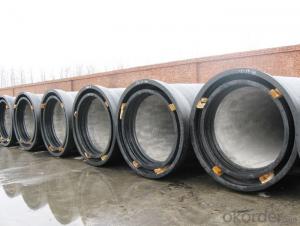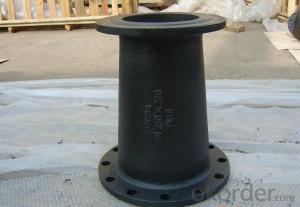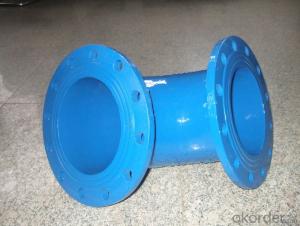Ductile Iron Pipe On Sale Made In China DN100
- Loading Port:
- Tianjin
- Payment Terms:
- TT OR LC
- Min Order Qty:
- 1000 m
- Supply Capability:
- 10000 m/month
OKorder Service Pledge
OKorder Financial Service
You Might Also Like
1.Packaging & Delivery
Packaging Detail: | DN80-300 bundled with steel belt ( the bundle size see the product detail part) DN400-1200 are in bulk |
Delivery Detail: | at least 5days for MOQ |
2.Specifications
Ductile iron pipe comply with ISO2531/EN545
1)We are factory
2)Best quality
3)Competive price
4)On time delivery
3.Features:
Facilitating high resistance to loadings, pressure and vacuum with high tensile strength,
Enabling high resistance to corrosion,
Not requiring cathodic protection,
Less operating cost since cast pipes have larger nominal diameter than polyethylene pipes.
Being the best pipe in case of an earthquake, with its ability of resilience and resistance to impacts without deformation,
Long product life, exceeding 50 years,
Preserving the quality of water with healthy interior coating.
4.Applied Standards:
General Design | ISO 2531 |
Internal Lining | ISO 4179 |
External Coating | ISO 8179 |
Polyethylene Coating (Optional) | ISO 8180 |
5.Joint Types:
Push-on Type | TYT Type |
Standard Type |
6. Diameters:
Pipes | Ø80 – Ø1200 mm (L = 6m, and 5.7m) |
Fittings | Ø80 - Ø2200 mm |
7. Wall Thickness:
Pipes | C and K classes |
Fittings | Class K10 - K12 |
8.Test Pressures:
Pipes | for Ø80 - Ø300 mm | 50 bar / 40 bar |
for Ø350 - Ø600 mm | 40 bar / 30 bar | |
for Ø700 - Ø1000 mm | 32 bar / 25 bar | |
for Ø1100 - Ø2600 mm | 25 bar |
Fittings | for Ø40 - Ø300 mm | 25 bar (*) |
for Ø350 - Ø600 mm | 16 bar | |
for Ø700 - Ø2600 mm | 10 bar | |
(*16 bar for fittings with PN10 flanges) | ||
9.Materials:
Pipe | Ductile iron casting, minimum 420 MPa tensile strength |
Internal Lining | Concrete Lining, ISO 4179 |
Socket Internal 10.Lining | 200 micron epoxy coating |
External Coating | 70 micron bitumen coating on 130 gr/m2 zinc coating, ISO 8179 |
Fittings | Ductile iron casting, minimum 420 MPa tensile strength |
Internal Lining | Concrete Lining, ISO 4179 |
External Coating | 70 micron bitumen coating on 130 gr/m2 zinc coating, ISO 8179 |
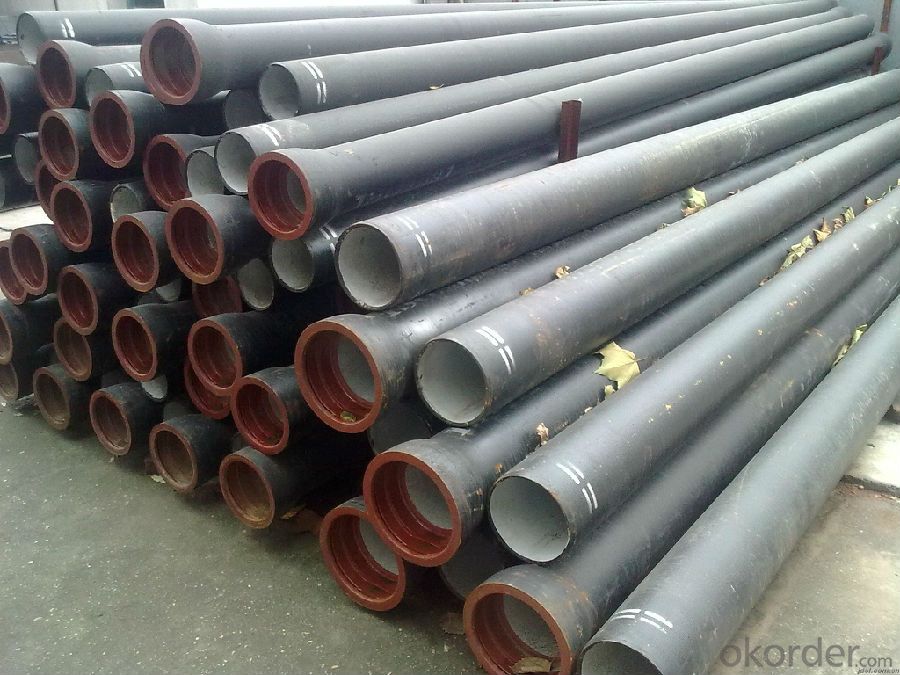
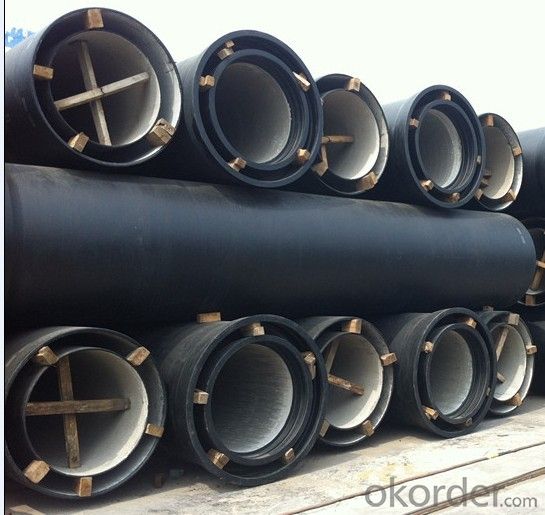
- Q:What is the disadvantage of nodular cast iron in excess of silicon?
- Silicon has a great influence on the performance of nodular cast iron. It mainly shows that silicon can refine graphite and improve the roundness of graphite ball.
- Q:What is the difference between ductile iron pipes and cast iron pipes?
- Ductile iron pipes and cast iron pipes have different compositions, properties, manufacturing processes, and applications. Ductile iron pipes are made from a type of cast iron known as ductile iron, which contains higher levels of carbon, silicon, and other alloying elements like magnesium. On the other hand, cast iron pipes are made from regular cast iron, which has a higher carbon content and lower levels of alloying elements. In terms of properties, ductile iron pipes are recognized for their high tensile strength, flexibility, and durability. They can withstand higher pressure and have a greater resistance to impact, making them suitable for applications that demand robust performance. Conversely, cast iron pipes are more brittle and fragile, making them susceptible to cracking or breaking under pressure or impact. The manufacturing process differs as well. Ductile iron pipes are formed through centrifugal casting, in which molten ductile iron is poured into a spinning mold. This centrifugal force aids in the even distribution of the molten metal, resulting in a strong and uniform pipe. On the other hand, cast iron pipes are made using sand casting, where molten cast iron is poured into a mold made of compacted sand. This method is less precise and can result in variations in the final product. In terms of applications, ductile iron pipes are commonly used in water and sewage systems, as well as in industrial pipelines that require high-pressure resistance. Cast iron pipes, on the other hand, are typically used in non-pressure applications such as drainage systems or underground sewer lines. To summarize, ductile iron pipes and cast iron pipes differ in their composition, properties, manufacturing processes, and applications. Ductile iron pipes offer greater strength, flexibility, and durability, making them suitable for high-pressure applications, while cast iron pipes are more brittle and commonly used in non-pressure applications.
- Q:How much is the working pressure of ductile iron pipe used in water supply pipe and how is MPa determined?
- In general, building materials products are production standards, the production process and specifications are required, pipe work pressure is based on the use of coffins and other factors set standards, pipes with different purposes, the pressure level is different.
- Q:Can ductile iron pipe be used for pump stations?
- Yes, ductile iron pipe can be used for pump stations. Ductile iron pipe is a commonly used material for underground water and wastewater systems, including pump stations. It offers several advantages such as high strength, durability, and corrosion resistance, making it suitable for such applications. Additionally, ductile iron pipe is compatible with various types of pumps and is known for its long service life, making it an ideal choice for pump station projects.
- Q:What is the weight of a typical ductile iron pipe?
- The weight of a typical ductile iron pipe can vary depending on its size and wall thickness. Generally, ductile iron pipes are available in sizes ranging from 3 inches to 64 inches in diameter. The weight of these pipes can range from a few pounds per foot for smaller sizes to several hundred pounds per foot for larger diameters. Wall thickness also plays a significant role in determining the weight of the pipe. Thicker walls will result in a heavier pipe. For instance, a 10-inch ductile iron pipe with a wall thickness of 0.25 inches may weigh around 26 pounds per foot, whereas a 24-inch ductile iron pipe with a wall thickness of 0.5 inches can weigh approximately 175 pounds per foot. It is important to consult specific manufacturer specifications or engineering references to determine the precise weight of a particular ductile iron pipe.
- Q:How can the ductile iron pipe be welded?
- The nickel electrode cold welding, such as Z408
- Q:It's not easy to drill ductile iron with cobalt high speed steel bit. Please help to point it out
- Determine the authentic M35 cobalt bit, which is about 65HRC in hardness. General workpiece hardness of about 45HRC or less of the problem.
- Q:Ductile iron pipe joint leakage
- After cleaning the pipe mouth, the cf-2000 high efficiency composite waterproof agent is used to seal it, and it will not leak.
- Q:How does ductile iron pipe perform in areas with high soil stability?
- Ductile iron pipe performs exceptionally well in areas with high soil stability. Its robust and durable nature allows it to withstand the pressures exerted by the stable soil, ensuring a reliable and long-lasting performance. Additionally, the flexibility of ductile iron allows it to accommodate ground movements and settlement without compromising its integrity. Overall, ductile iron pipe is a suitable choice for areas with high soil stability, providing efficient and dependable water distribution and sewerage systems.
- Q:How can the steel plastic composite pipe be connected with the cast iron pipe?
- The hoop has the advantages of beautiful appearance, convenient operation, strong clamping force, good sealing performance, etc.. Mainly used for connecting and fastening vehicle, ship, diesel engine, gasoline engine, machine tools, fire, and other machinery and equipment, chemical equipment general nylon hose, plastic hose, hose cloth, water interface and seal etc..
1. Manufacturer Overview |
|
|---|---|
| Location | |
| Year Established | |
| Annual Output Value | |
| Main Markets | |
| Company Certifications | |
2. Manufacturer Certificates |
|
|---|---|
| a) Certification Name | |
| Range | |
| Reference | |
| Validity Period | |
3. Manufacturer Capability |
|
|---|---|
| a)Trade Capacity | |
| Nearest Port | |
| Export Percentage | |
| No.of Employees in Trade Department | |
| Language Spoken: | |
| b)Factory Information | |
| Factory Size: | |
| No. of Production Lines | |
| Contract Manufacturing | |
| Product Price Range | |
Send your message to us
Ductile Iron Pipe On Sale Made In China DN100
- Loading Port:
- Tianjin
- Payment Terms:
- TT OR LC
- Min Order Qty:
- 1000 m
- Supply Capability:
- 10000 m/month
OKorder Service Pledge
OKorder Financial Service
Similar products
New products
Hot products
Hot Searches
Related keywords


